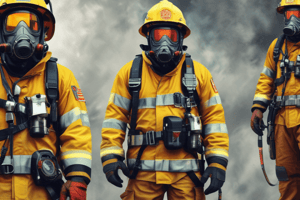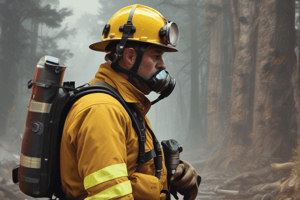Podcast
Questions and Answers
What is a critical factor that can impair the safety of emergency responders during operations?
What is a critical factor that can impair the safety of emergency responders during operations?
- Use of outdated firefighting equipment
- Lack of adequate rest and rehydration (correct)
- Constant exposure to high humidity
- Excessive training in low temperatures
Which climatic condition indicates a need for establishing rehabilitation on the incident scene?
Which climatic condition indicates a need for establishing rehabilitation on the incident scene?
- Rainfall above 2 inches per hour
- Wind Chill Index above 20°F
- Heat Stress Index above 90°F (correct)
- Humidity levels below 20%
What role does the Incident Commander play in rehabilitation during an emergency response?
What role does the Incident Commander play in rehabilitation during an emergency response?
- Compile data for post-incident analysis only
- Only supervise the equipment used
- Monitor social media for updates
- Ensure provisions for rest and rehabilitation are made (correct)
What is one of the primary reasons to consider rehabilitation during an operation?
What is one of the primary reasons to consider rehabilitation during an operation?
What type of monitoring should Unit Officers conduct during operations?
What type of monitoring should Unit Officers conduct during operations?
What should personnel be encouraged to do during periods of hot weather?
What should personnel be encouraged to do during periods of hot weather?
What can occur if emergency responders become fatigued?
What can occur if emergency responders become fatigued?
Which of the following is NOT a provision to be made by the Incident Commander for rehabilitation?
Which of the following is NOT a provision to be made by the Incident Commander for rehabilitation?
What is the maximum allowable systolic blood pressure for personnel to be released from Rehab after 20 minutes?
What is the maximum allowable systolic blood pressure for personnel to be released from Rehab after 20 minutes?
At what maximum heart rate percentage should personnel be monitored after resting in Rehab?
At what maximum heart rate percentage should personnel be monitored after resting in Rehab?
What SpO2 reading indicates a severe level of hypoxemia?
What SpO2 reading indicates a severe level of hypoxemia?
What is the critical temperature threshold that prohibits a member from wearing thermal protective equipment?
What is the critical temperature threshold that prohibits a member from wearing thermal protective equipment?
What is the primary responsibility of the Rehab Group Supervisor regarding the NFIRS Rehab tab?
What is the primary responsibility of the Rehab Group Supervisor regarding the NFIRS Rehab tab?
Which condition reflects moderate hypoxemia based on SpO2 readings?
Which condition reflects moderate hypoxemia based on SpO2 readings?
What should be done for personnel who maintain a SpCO reading above 10% by the end of 20 minutes in Rehab?
What should be done for personnel who maintain a SpCO reading above 10% by the end of 20 minutes in Rehab?
What is considered the danger category when humidity is between 90°F and 105°F?
What is considered the danger category when humidity is between 90°F and 105°F?
What should be done for personnel with a heart rate exceeding 100 beats per minute after 20 minutes in Rehab?
What should be done for personnel with a heart rate exceeding 100 beats per minute after 20 minutes in Rehab?
What temperature adjustment should be made when personnel are wearing protective clothing?
What temperature adjustment should be made when personnel are wearing protective clothing?
What is the primary function of the Rehab Group in an emergency incident?
What is the primary function of the Rehab Group in an emergency incident?
Which characteristic is NOT important for the location of the Rehab Area?
Which characteristic is NOT important for the location of the Rehab Area?
When must a firefighter be assigned to the Rehab Area based on their work duration?
When must a firefighter be assigned to the Rehab Area based on their work duration?
What is recommended to avoid when firefighters are exposed to heat stress?
What is recommended to avoid when firefighters are exposed to heat stress?
What type of food is recommended for firefighters during a prolonged operation?
What type of food is recommended for firefighters during a prolonged operation?
Which process is considered 'active cooling' for firefighters in the Rehab Area?
Which process is considered 'active cooling' for firefighters in the Rehab Area?
What should be the minimum rest duration for members after intense work before reentering operational duties?
What should be the minimum rest duration for members after intense work before reentering operational duties?
What is a critical necessity for maintaining hydration during heat stress?
What is a critical necessity for maintaining hydration during heat stress?
Which of the following items is NOT typically used in the Rehab Area?
Which of the following items is NOT typically used in the Rehab Area?
What is the role of the Rehab Group Supervisor?
What is the role of the Rehab Group Supervisor?
Which statement best describes passive cooling methods?
Which statement best describes passive cooling methods?
What is a key consideration in the medical evaluation of personnel entering the Rehab Area?
What is a key consideration in the medical evaluation of personnel entering the Rehab Area?
During cold weather operations, what is essential for preventing heat stress?
During cold weather operations, what is essential for preventing heat stress?
What is advised for quick energy replacement during prolonged incidents?
What is advised for quick energy replacement during prolonged incidents?
Flashcards are hidden until you start studying
Study Notes
Firefighting and Emergency Operations Demands
- Firefighting presents significant physical and mental challenges due to extreme environmental conditions.
- Insufficient rest and hydration increase the risk of illness and compromise responder safety and decision-making.
- Fatigue can reduce reaction times and impair critical operational abilities.
Rehabilitation Importance
- Rehabilitation (Rehab) is crucial during emergency responses to mitigate risks like heat exhaustion and heat stroke.
- Proper planning for Rehab involves recognizing the nature of the event, including long durations and high labor intensity.
- Heat Stress Index above 90°F or Wind Chill Index below 10°F are indicators for establishing Rehab.
Incident Commander Responsibilities
- Ensure early provisions for rest, recovery, rehydration, and medical evaluation for all personnel.
- Make necessary accommodations for members facing extreme environmental conditions.
Unit Officer and Personnel Responsibilities
- Supervisors must monitor crew conditions and initiate personnel relief as necessary.
- Members should proactively inform supervisors about fatigue levels or exposure that might jeopardize safety.
Establishing the Rehab Group
- Assign a Rehab Group Supervisor—usually an EMS Field Supervisor—to oversee the group.
- Select a Rehab Area that allows respite from hazards, facilitates gear removal, and provides protection from the elements.
- Ensure the site is spacious enough, accessible for EMS units, and allows for quick re-entry into operations.
Required Resources for the Rehab Area
- Must include healthcare supplies (blood pressure cuffs, oxygen devices), fluids (water, electrolyte solutions), food (soups), and cooling equipment (fans, tarps).
- Communication should remain clear to ensure adequate staffing and resources.
Rehabilitation Guidelines
- Enter Rehab after exhausting one SCBA cylinder or 40 minutes of intense work.
- Hydration is critical; consume at least one quart of fluids an hour, favoring water and electrolyte mixes.
- Avoid carbonated and caffeinated drinks before or during heat exposure.
Cooling Techniques
- Passive cooling: Move crew to a cooler area; remove personal protective equipment (PPE).
- Active cooling: Use cold water immersion or wet towels to lower body temperature.
Nutrition and Rest
- Provide quick-digesting nourishment—soups and fruits recommended; avoid heavy/fatty foods.
- Minimum rest period is 10 minutes; extend to at least 20 after significant exertion.
Medical Evaluation Procedures
- All members entering the Rehab Area undergo medical evaluation including vital signs monitoring.
- Specific thresholds for temperature (above 100.6°F), heart rate (above 100 bpm after 20 minutes), and blood pressure (above 160/100) indicate continued monitoring or extended stay.
- SpO2 levels should ideally remain above 91%, and values below warrant further evaluation.
National Fire Incident Reporting System (NFIRS)
- The Rehab Group Supervisor must complete and close out the NFIRS Rehab tab to document the incident properly.
Humidity and Danger Indices
- Temperature and humidity affect injury threat categories, with caution advised at 80-90°F, and extreme danger above 130°F.
- Wind chill factors can significantly lower perceived temperature, increasing frostbite risk for unprotected skin.
Conclusion
- Comprehensive knowledge of rehabilitation practices is essential for maintaining the health and safety of emergency responders during operations.
Studying That Suits You
Use AI to generate personalized quizzes and flashcards to suit your learning preferences.




